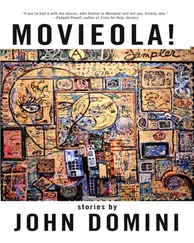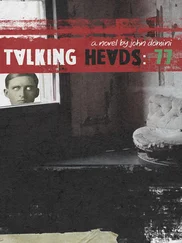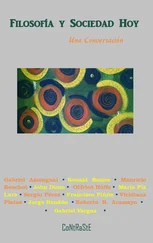And come bedtime, while she and Jay exchanged mumbles about the ups and downs of the workplace, these worked like a relaxation massage composed entirely of words. The Jaybird sometimes broke into a snore before he finished an anecdote. Even to discuss the politics of the clinic had a gentling effect, strange when Barbara thought about it. In this same bed, after all, she’d lost hours of sleep fretting over who was calling the shots within the family.
Yet Barbara’s visits to the inner lives of the terremotati could also leave her troubled and let down. There was a distressed afternoon or two when she picked up her bodyguard outside the clinic and, before getting into the car, shook off anyone who approached her for a handout or a prayer. She wasn’t able to do much for a lot of these cases, no more than for Maria Elena back in Bridgeport. Rather she was forced to see as well the stubbornness, the grip of pattern and loop, that had made those syndromes so familiar in the first place. It hardly mattered when Barbara didn’t understand a victim’s fevered Italian, peppered with dialect. She couldn’t mistake the old story of their night sweats. During such difficult nights, the vision of a visiting saint only distracted these terramotati from the real problem. Worse, it was usually the same saint, Padre Pio. Pio was a recent addition to the canon, a Capuchin who’d worked his miracles in the 1950s and 1960s, and mediagenic in his way. Nowadays, when Fond came on the tube to pester the family, he earned his camera time by a sleek hint of hard living. The refugee Lazarus. Pio had been the opposite, Yoda, squat and wrinkled yet aglow within his robes. He was said to have convinced a movie producer, via telepathy, to bankroll La Dolce Vita . And so long as Barbara worked downtown, it seemed that some of the sorry creatures she tried to help would’ve gotten more out of watching Fellini than going on their knees to Padre Pio. Fellini would at least have showed them outrageous faces not unlike what had hurt them. But the figure out of their Catholic faith, Barbara’s own faith, got in the way of their trauma, of coming to know it, as if they’d hung some hollow gold knickknack over the pain — another ojetto for the city’s tormented walls. She hated to see it. Her church had brought her better than that, palpable comfort, honest strength.
But the clinic’s population couldn’t risk depths like that. They preferred the saints, the stand-ins. None of these patients claimed to have seen the Devil, or none that Barbara talked to, though a couple suffered nightmares in which some troublesome relative figured as a witch. She knew all about that one. She understood the kind of people she was dealing with, Cesare’s “bourgeois.” These were card-carrying citizens, the professional class, all registered with the national health program. Yet while DiPio’s cases had little in common with the desperate strays out at the Centro Rifugiati , they were by no means untouched by tragedy. More than once Barbara was left looking for a place to pull herself together, trying unknown doors with a dripping face. There was a man who couldn’t get beyond a thoughtless curse he’d growled at his mother, an angry word that he believed had attracted the Evil Eye. There was a woman who spoke obsessively, in halting half-English, of the extension cords she’d run into a child’s bedroom, overloading the circuit behind the wall.
And there was one neurosis Barbara had never come across in the textbooks, nor on the internet either: a man who claimed he couldn’t be living in Naples because he wasn’t old enough. This was a guy of about sixty who styled his remaining hair in a frowsy Mohawk and claimed he was still at work on his name. Every stage of life, so Mohawk believed, was a city. He himself had only recently reached the minimum entry requirement for elementary cities, like the fresh and exotic Portland, Oregon. In another ten years, if he kept up his research and steered clear of the wrong crowd, he might grow into Houston or Tokyo. The last thing you wanted, he explained, was to try and jump a level — to claim a more complex citizenship before you’d worked up the orientation. The last thing you wanted was to have the avenues around you all at once changing direction, thrusting out fresh lampposts like fingers through the holes of an afghan, the lampposts plastered with notices in God knows what language and your own frail body God knows how far from the sidewalk. Or you might discover yourself at the wheel of a new SmartFiat, engineered to millennial environmental standards, careening head-on towards a knight on horseback toppling from his pedestal. Repeatedly the old-timer insisted he wasn’t ready for the next move, and not nearly prepared for the adult dose that was Naples, or say Damascus. Those sank their underground agora and raised their satellite dishes only for the most mature.
Delusionary, indeed. The guy could’ve taught Barbara something. If she’d spent more time with this “unripened metropolis,” him and his frayed toothbrush of a hairdo, she too might’ve achieved a more profound shakeup and understanding. So she told herself at week’s end, anyway, after one of the ranking psychologists asked her into his cubicle.
This doctor had done two years at UCLA, and she could hear it in his voice, relaxed, beach-y. Nonetheless he was firm with her. The man made it clear that he and the rest of the medical staff could no longer trust the fragile personalities around here to an amateur. No longer, Mrs. Lulucita. She didn’t have so much as a certificate for social work, let alone medical credentials.
After a while — after he saw how calmly she took the news — the psychologist began to sound more Californian. He assured Barbara that everyone in the clinic had nothing but affection for her, personally. She’d brought a fresh perspective to the work, and that was always useful. She was certainly welcome to help in some other capacity, some sort of work like her husband did…
“Like my husband?” Barb tugged at her shirtfront. “What? Take out the trash?”
The doctor ran the entire length of his tie between thumb and forefinger. When he spoke, the edge had returned to his voice. “I realize that you and your husband have powerful friends.”
He realized, too, that dottore DiPio himself was among those friends. But Mrs. Lulucita needed to understand, should she have it in mind to contest the staff’s decision, that DiPio didn’t oppose it. He might be a bit of a maverick, the old man, but he would never go against the consensus of the people he depended on to run his clinic. And (at this the young therapist fingered his tie again) additional funding from the Consulate wouldn’t change anyone’s mind either.
“Ci sono limite,” he concluded, his first sentence in Italian. “There are limits.”
Her driver and bodyguard, the big curly-head, hadn’t expected l’Americana to knock off early. Now as Barbara waited for him, on the bench inside the clinic’s iron gateway, she figured that what she felt was something like her Vomero priest in his church: she was disgusted with herself for all the time she’d spent eavesdropping, her whole working week vicarious. Yet even this afternoon, in Naples she couldn’t remain entirely a sourpuss, not as the downtown emerged from riposo , as it set up a fresh display of the pedestrian baroque. Barbara discovered, or rediscovered, that this must’ve been part of the reason she’d chosen to work down here in the original city. She’d never grown indifferent its stagy mash of hustle and museum effects. There was still the echo, the gesturing, the whole-body Neapolitan shrug. Then too, one or two downtowners recognized the mother of the miracolino; they came close enough to extend a medallion or crucifix through the bars. A man who looked to be at least eighty, his hand like the brown husk of an insect, went into a staggering bow as he held out a silver-plated heart.
Читать дальше












